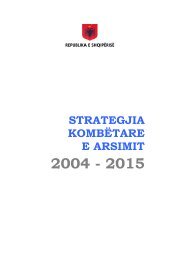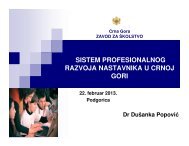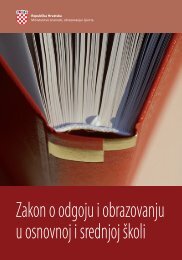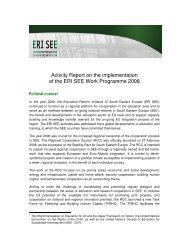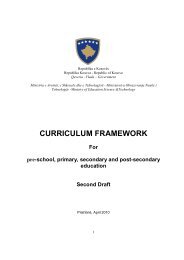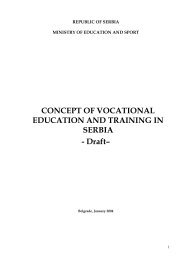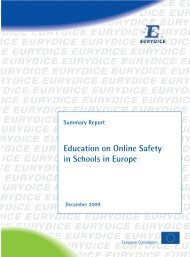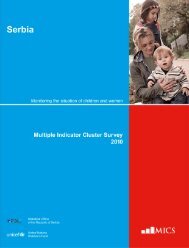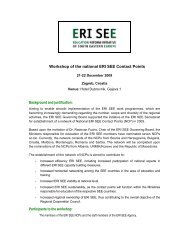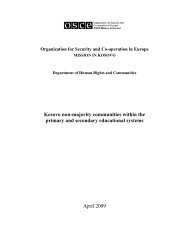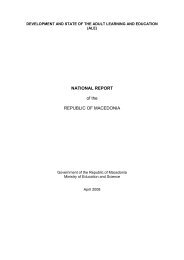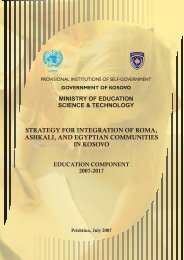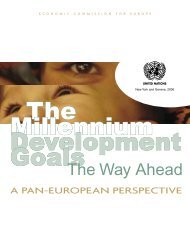dubrovnik conference in higher education âaddressing the ... - ERI SEE
dubrovnik conference in higher education âaddressing the ... - ERI SEE
dubrovnik conference in higher education âaddressing the ... - ERI SEE
You also want an ePaper? Increase the reach of your titles
YUMPU automatically turns print PDFs into web optimized ePapers that Google loves.
DUBROVNIK CONFERENCE IN HIGHER EDUCATION “ADDRESSING THE QUESTIONS OFINSTITUTIONAL REFORMS IN <strong>SEE</strong> COUNTRIES IN CREATING THE EUROPEAN HIGHEREDUCATION AREA“, DUBROVNIK-CROATIA, 29-31 OCTOBER 2007.- Project purpose and objectives of <strong>the</strong> ConferenceThe purpose of <strong>the</strong> Conference was to exam<strong>in</strong>e <strong>the</strong> challenges of Central and South Eastern Europeancountries <strong>in</strong> creat<strong>in</strong>g a European Higher Education area and <strong>in</strong> particular <strong>the</strong> reforms needed <strong>in</strong> <strong>the</strong><strong>in</strong>stitutions that govern <strong>higher</strong> <strong>education</strong>.The objective of <strong>the</strong> Conference was to provide a platform for exchange of relevant experience <strong>in</strong> selected topics:• Professionalisation of public management of <strong>higher</strong> <strong>education</strong>• University legal status• Acceleration of Higher Education <strong>in</strong>stitutional reforms• Standardisation of <strong>the</strong> student experience across <strong>the</strong> EHEA with regard to student organisationsand representation.- Project implementationOrganisers of <strong>the</strong> ConferenceThe Conference was jo<strong>in</strong>tly organised by three universities: <strong>the</strong> University of Zagreb-Croatia (host<strong>in</strong>g<strong>in</strong>stitution), <strong>the</strong> University of Novi Sad-Serbia and <strong>the</strong> University of Vienna-Austria.The event was strongly supported by <strong>the</strong> follow<strong>in</strong>g <strong>in</strong>ternational organisations, national <strong>higher</strong> <strong>education</strong>authorities, govermental <strong>in</strong>stitutions and non governmental associations: <strong>the</strong> Council of Europe, Stability Pactfor South Eastern Europe, European University Association, UNESCO-CEPES, European Students Union,Austrian Federal M<strong>in</strong>istry of Science and Research, Irish Higher Education Authority, Turkish Council ofHigher Education, Croatian M<strong>in</strong>istry of Science, Education and Sports, Serbian M<strong>in</strong>istry of Education & <strong>the</strong>Secretariat for Education and Culture of <strong>the</strong> Autonomous Prov<strong>in</strong>ce of Vojvod<strong>in</strong>a, <strong>the</strong> Education ReformInitiative of South Eastern Europe (<strong>ERI</strong> <strong>SEE</strong>) and SPARK-The Ne<strong>the</strong>rlands.ParticipantsOver 100 participants from European <strong>higher</strong> <strong>education</strong> <strong>in</strong>stitutions, public authorities, <strong>in</strong>ternationalorganisations, governmental <strong>in</strong>stitutions and non-governmental associations took part to <strong>the</strong> Conference.<strong>ERI</strong> <strong>SEE</strong> supported <strong>the</strong> publish<strong>in</strong>g of <strong>the</strong> promotional materials and <strong>the</strong> local expenses (food, meet<strong>in</strong>g room,guided tour etc.).Topics covered dur<strong>in</strong>g <strong>the</strong> ConferenceThe Confernce took place <strong>in</strong> <strong>the</strong> Centre for Advanced Academic Studies located <strong>in</strong> Dubrovnik-Croatia.30 OctoberThe organisation of <strong>the</strong> Conference was endorsed and <strong>the</strong> participants welcomed by high officials of: <strong>the</strong>University of Zagreb-Croatia, <strong>the</strong> Stability Pact of South Eastern Europe, <strong>the</strong> Council of Europe, <strong>the</strong>European University Association, <strong>the</strong> M<strong>in</strong>istry of Science, Education and Sport of <strong>the</strong> Republic of Croatia,and <strong>the</strong> University of Novi Sad-Serbia.Dr. Ladislav Novak from <strong>the</strong> University of Novi Sad provided <strong>the</strong> open<strong>in</strong>g address.The first morn<strong>in</strong>g session “Higher Education Reform as a Vehicle for Regional Cooperation: View fromInternational Organisations“ covered: <strong>the</strong> Stability Pact address on <strong>the</strong> importance of <strong>the</strong> <strong>higher</strong> <strong>education</strong><strong>in</strong>stitution reform as an advance guard for <strong>the</strong> regional cooperation <strong>in</strong> <strong>SEE</strong>; <strong>the</strong> presentation of <strong>the</strong> Councilof Europe on <strong>the</strong> role of <strong>the</strong> legislative changes <strong>in</strong> advanc<strong>in</strong>g <strong>higher</strong> <strong>education</strong> <strong>in</strong>stitutional reform; <strong>the</strong>presentation of <strong>the</strong> ESU view of <strong>the</strong> <strong>higher</strong> <strong>education</strong> reform from student's perspective; <strong>the</strong> expertperception of <strong>the</strong> Bologna Process and <strong>the</strong> <strong>higher</strong> <strong>education</strong> <strong>in</strong>stitutional reform; <strong>the</strong> SPARK view of <strong>the</strong>
<strong>higher</strong> <strong>education</strong> <strong>in</strong>stitutional reform as an emergency bridge between <strong>the</strong> societies <strong>in</strong> conflict; andpresentation of <strong>the</strong> answers to <strong>the</strong> Conference questionnaire.The second morn<strong>in</strong>g session “Institutional Reform/Amend<strong>in</strong>g Higher Education Legislation: View fromNational Higher Education Authorities“ provided <strong>in</strong>formation on <strong>the</strong> processes <strong>in</strong> Austria, Sweden andCroatia.Dur<strong>in</strong>g <strong>the</strong> afternoon planary session “Higher Education Institutional Reform Process: View from Universities“,<strong>the</strong> activities and efforts of Poland, Lithuania and Serbia were presented.The work cont<strong>in</strong>ued <strong>in</strong> two parallel sessions.• Session “The Higher Education System“The <strong>in</strong>troductory presentations covered: <strong>the</strong> role of buffer bodies <strong>in</strong> achiev<strong>in</strong>g authonomy andaccountability of universities (<strong>the</strong> case of Ireland); <strong>the</strong> Turkish presentation of <strong>the</strong> foundation universitiesand <strong>the</strong> World Bank view on <strong>the</strong> challenges of <strong>higher</strong> <strong>education</strong> systems <strong>in</strong> <strong>SEE</strong>.• Session “The Integrated University“The keynote speaches on <strong>the</strong> topic addressed: <strong>the</strong> Austrian example of university authonomy; <strong>the</strong>UNESCO-CEPES presentation on <strong>the</strong> <strong>in</strong>stitutional governance and structures and <strong>the</strong> ESU presentationof <strong>the</strong> student organisation with<strong>in</strong> an <strong>in</strong>tegrated university.31 OctoberThe presentations provided feedback on <strong>the</strong> work and recommendations from <strong>the</strong> two parallel sessions thattook place on 30 th October and enabled discussion on <strong>the</strong> content of <strong>the</strong> f<strong>in</strong>al document of <strong>the</strong> DubrovnikConference.F<strong>in</strong>al Document of <strong>the</strong> Dubrovnik ConferenceThe Conference built upon <strong>the</strong> outcomes of <strong>the</strong> International Sem<strong>in</strong>ar on Higher Education held <strong>in</strong> Novi Sad<strong>in</strong> 28 – 30 October 2005 (<strong>the</strong> Novi Sad Initiative).The participants fully endorsed <strong>the</strong> Novi Sad conclusions adopted <strong>in</strong> 2005. Ra<strong>the</strong>r than restate or update <strong>the</strong>pr<strong>in</strong>ciples and general action l<strong>in</strong>es outl<strong>in</strong>ed <strong>in</strong> that document, <strong>the</strong> challenge focused on identify<strong>in</strong>g specificpriorities and concrete actions, and to ensure a strategy for implementation.The participants also reaffirmed <strong>the</strong> outcomes of <strong>the</strong> EUA Vienna Sem<strong>in</strong>ar 2006 on streng<strong>the</strong>n<strong>in</strong>g <strong>higher</strong><strong>education</strong> and research <strong>in</strong> South East Europe, <strong>in</strong> particular part 3 devoted to <strong>in</strong>stitutional reform anddevelopment, emphasis<strong>in</strong>g <strong>the</strong> need for provid<strong>in</strong>g <strong>in</strong>centives for <strong>higher</strong> <strong>education</strong> reform and <strong>the</strong> <strong>in</strong>tegrationof universities <strong>in</strong>to s<strong>in</strong>gle legal entities.The Conference identified a need for action to professionalise <strong>the</strong> public management andadm<strong>in</strong>istration of <strong>higher</strong> <strong>education</strong> – both with<strong>in</strong> universities and also with<strong>in</strong> m<strong>in</strong>istries by br<strong>in</strong>g<strong>in</strong>g updatedknowledge of <strong>higher</strong> <strong>education</strong> topics and challenges closer to <strong>the</strong> <strong>higher</strong> <strong>education</strong> adm<strong>in</strong>istrators <strong>in</strong> <strong>the</strong><strong>in</strong>stitutions that govern <strong>higher</strong> <strong>education</strong>. The participat<strong>in</strong>g universities pledged to address this issue bycooperat<strong>in</strong>g <strong>in</strong> <strong>the</strong> development of regional programmes and summer schools for <strong>higher</strong> <strong>education</strong>adm<strong>in</strong>istrators, also tak<strong>in</strong>g <strong>in</strong>to account and build<strong>in</strong>g upon exist<strong>in</strong>g networks of cooperation.S<strong>in</strong>ce 2005, considerable progress has been made, at different speeds <strong>in</strong> <strong>the</strong> different <strong>in</strong>stitutions andcountries <strong>in</strong> <strong>the</strong> region. Participants welcomed this progress, but also underl<strong>in</strong>ed that efforts need to bestepped up if <strong>the</strong> benefits of regional cooperation are to be realised <strong>in</strong> all countries.The participants also emphasised <strong>the</strong> critical role of students <strong>in</strong> develop<strong>in</strong>g <strong>higher</strong> <strong>education</strong> <strong>in</strong> <strong>the</strong> region.Student participation <strong>in</strong> university governance and policy debate should be considered as an essentialelement of positive and healthy <strong>higher</strong> <strong>education</strong> development. As a practical step, <strong>the</strong> Conferencerecommended that every future national and regional <strong>in</strong>ter-university meet<strong>in</strong>g should ensure thatstudents are represented <strong>in</strong> delegations.There was clearly strong agreement about <strong>the</strong> importance of student <strong>in</strong>volvement <strong>in</strong> European <strong>higher</strong><strong>education</strong> governance - although with different views about how this can best be taken forward and <strong>the</strong>reforeit may be important to focus on <strong>the</strong> role of student unions <strong>in</strong> <strong>the</strong> region/Europe <strong>in</strong> a future meet<strong>in</strong>g.2
All countries <strong>in</strong> <strong>the</strong> region are becom<strong>in</strong>g <strong>in</strong>creas<strong>in</strong>gly active and engaged <strong>in</strong> <strong>the</strong> Bologna process, but muchmore could and should be done to ensure positive development. The Conference encourages alluniversities to exploit <strong>the</strong> opportunities for <strong>in</strong>stitutional development and regional cooperationthrough European programmes support<strong>in</strong>g <strong>higher</strong> <strong>education</strong>. One major concern for <strong>the</strong> future is thatuniversity research capacity is weak, and conditions do not exist to develop <strong>the</strong> talent pool <strong>in</strong> <strong>the</strong> region, or toattract talented researchers from o<strong>the</strong>r parts of <strong>the</strong> world. While <strong>the</strong> EU Framework programmes offer somenew opportunities, <strong>the</strong> Conference also called for support to establish a Regional Research Fund particularlyaddressed at early stage researchers, and us<strong>in</strong>g a competitive fund<strong>in</strong>g model as an <strong>in</strong>centive <strong>in</strong> creation of avariety of attractive regional centres of excellence. A particular ambition should be to concentrate ondevelop<strong>in</strong>g diverse university strengths <strong>in</strong> <strong>the</strong> region, along with a frame for <strong>the</strong> quality <strong>in</strong> diversity.The participants recognised that regional cooperation is only possible if greater mobility opportunities arefacilitated not only <strong>in</strong> Europe and <strong>the</strong> rest of <strong>the</strong> world, but also with<strong>in</strong> <strong>the</strong> region. The Conference called ongovernments and universities <strong>in</strong> <strong>the</strong> region to take responsibility for develop<strong>in</strong>g and encourag<strong>in</strong>g mobilityopportunities for students, researchers and professors through provid<strong>in</strong>g <strong>in</strong>centives for cooperation,develop<strong>in</strong>g jo<strong>in</strong>t programmes, and encourag<strong>in</strong>g academic cooperation and network<strong>in</strong>g.The Dubrovnik Conference was launched to address a set of issues that are crucial to <strong>the</strong> implementation of<strong>the</strong> European Higher Education Area, and to promote more effective regional cooperation. The F<strong>in</strong>alRecommendation calls for a strong and renewed effort to speed up <strong>the</strong> process of <strong>in</strong>stitutionalreforms, by reth<strong>in</strong>k<strong>in</strong>g <strong>the</strong> role of governments <strong>in</strong> provid<strong>in</strong>g <strong>in</strong>centives for <strong>higher</strong> <strong>education</strong> reform,professionalis<strong>in</strong>g <strong>the</strong> public management of <strong>higher</strong> <strong>education</strong>, <strong>in</strong>tegrat<strong>in</strong>g university <strong>in</strong>to s<strong>in</strong>gle legalentity and thus encourag<strong>in</strong>g trust <strong>in</strong> <strong>in</strong>stitutions. Competent <strong>in</strong>termediary bodies may be set up forspecific tasks, such as fund<strong>in</strong>g, research management and quality assurance along with non-political nationalboards of trustees with responsibilities prescribed by law, hav<strong>in</strong>g members nom<strong>in</strong>ated by severalstakeholders (government, universities, <strong>in</strong>dustry, etc). Higher Education legislation should also beamended to support such a policy approach.These issues cannot all be resolved <strong>in</strong> <strong>the</strong> next two years, and <strong>the</strong> dialogue needs to cont<strong>in</strong>ue. This may berealised by biannual <strong>conference</strong>s to follow up <strong>the</strong> <strong>in</strong>itiatives of <strong>the</strong> 2005 Novi Sad Conference and <strong>the</strong> 2007Dubrovnik Conference, to br<strong>in</strong>g <strong>the</strong> process of <strong>higher</strong> <strong>education</strong> <strong>in</strong>stitutional reform to <strong>the</strong> attention of <strong>the</strong>political and academic leadership of Europe. In order to ensure cont<strong>in</strong>uity and monitor <strong>the</strong> reform processbetween two biannual events consultations will be taken <strong>in</strong> <strong>the</strong> course of creation of a steer<strong>in</strong>g body.3



